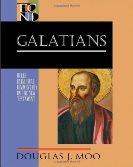Reviewed by Jarvis J. Williams
Introduction
Douglas J. Moo serves as the Kenneth T. Wessner Professor of New Testament at Wheaton College Graduate School in Wheaton, IL. He is an established Pauline scholar, who has written several monographs — including a major commentary on Romans. His most recent contribution to Pauline Studies is his highly anticipated Galatians commentary in the competent Baker Exegetical Commentary series. This review will briefly survey the content of the commentary and highlight a few of the commentary’s many insightful contributions.
Brief Survey and Interaction
In keeping with the high standard of the preceding commentaries in the Baker Exegetical series (e.g. Matthew, Mark, Luke, John, Romans, Ephesians, and 1 Peter to name a few), Moo’s Galatians commentary combines rigorous grammatical-historical exegesis and rich theological reflection with a strong Evangelical tone. Moo manages to do this while making his work accessible to the non-specialist.
First, Moo begins his commentary with a lucid and informative introduction (pgs. 1-63). His introduction discusses important issues like the Northern versus Southern Galatian theories and the dating of the letter (pgs. 2-18). One of the most insightful and preparatory parts of the introduction is Moo’s discussion of selective theological themes in Galatians (pgs. 31-61). In this section, Moo offers a detailed and fruitful theological discussion of key Pauline theological themes and issues in Galatians. For example, Moo’s comments on salvation history and apocalyptic (pgs. 31-32), the gospel (pg. 32), Christ (pgs. 33-34), the Spirit (p. 34), the law (pgs. 35-37), faith in versus faith of Christ (pgs. 38-47), and justification (pgs. 48-61) prepare the reader for the careful exegetical analysis and the rich theological reflection to come in the commentary of individual texts.
Second, Moo has a widespread reputation among New Testament scholars for being a strong and careful exegete. As Tom Schreiner states in his endorsement on the back of the commentary, “Douglas Moo’s expertise as a commentator is well known, and his skill is on display in this outstanding commentary on Galatians.” Every single section of Galatians is carefully but succinctly explained with good old-fashioned grammatical-historical exegesis. In addition to Moo’s impressive exegesis of each text in Galatians, he helpfully discusses relevant grammatical issues that affect interpretation (e.g. faith in versus faith of Christ=objective versus subjective genitive) minus gratuitous grammatical information (e.g. pgs. 38-48, 160-63).
Third, Moo successfully grounds his interpretation of Galatians in its first-century Greco-Roman and Jewish polemical context. As he does this, he discusses both the relevant Old Testament and Second Temple Jewish texts that aid one’s interpretation of the text in Galatians. Although, as an Evangelical scholar, Moo certainly has pastoral concerns in mind throughout the commentary, his fundamental concern is to explain the meaning of Paul’s letter to the Galatians to the original audience to whom he wrote it. Moo is keenly aware of the various alternative interpretations made by various readers of Galatians throughout the history of interpretation, but his primary focus from beginning until the end of his commentary is to explain Galatians in light of Paul’s first century social and polemical setting.
Fourth, Moo points out the strengths of certain New Perspective readings of Paul, while noting the dangers of radical Newer Perspective readings of Paul (pgs. 145-73, 201-16). Moo’s understanding of the text is not eclipsed by his discussions of the readings of Paul that diverge from his own reading, but his discussions of competing views inform the reader of current issues in certain texts.
Conclusion
Moo’s commentary on Galatians is another significant contribution from the pen of a world class Evangelical New Testament scholar. The commentary’s combination of grammatical-historical exegetical rigor, rich theological reflection, and pastoral sensitivities make this work both another welcomed addition to the now famous Baker Exegetical series in the Evangelical community and a must read for scholars, students, and pastors who are working through Galatians. This work is especially a must read for those who approach Galatians from an Evangelical faith-tradition — although all readers could profit from the commentary. Moo’s detailed discussion of justification is alone worth the price of the commentary.
Along with the exegetical and theological content, the editors — Robert W. Yarbrough and Robert H. Stein — have done another tremendous job carefully editing the commentary and providing readers a clean and nearly flawless product. As I write my own commentary on Galatians for the New Covenant Commentary series and as I teach and preach through Galatians in the classroom and in the church, I will look often to this fantastic addition to the Baker Exegetical commentary series. I have a few minor exegetical disagreements with Moo here and there, but my biggest complaint about his commentary is that it sadly ends too soon. I could gladly read another 406 pages about Galatians from the pen of Moo. Scholars, students, and pastors should purchase this commentary and watch a master exegetical craftsman do his work with excellent scholarly precision and skill! I highly recommend this work!
Jarvis J. Williams, Ph.D., is Associate Professor of New Testament Interpretation at The Southern Baptist Theological Seminary and Review Editor for New Testament here at Books At a Glance.
